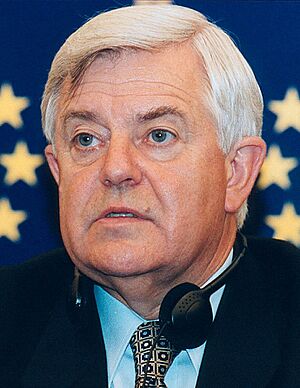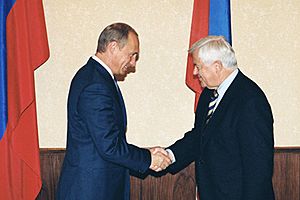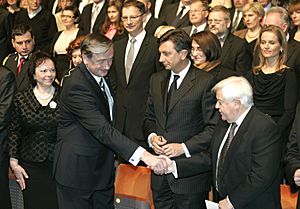Milan Kučan facts for kids
Quick facts for kids
Milan Kučan
|
|
|---|---|

Kučan in 2000
|
|
| 1st President of Slovenia | |
| In office 23 December 1991 – 22 December 2002 |
|
| Prime Minister | Lojze Peterle Janez Drnovšek Andrej Bajuk Janez Drnovšek Anton Rop |
| Preceded by | Office established |
| Succeeded by | Janez Drnovšek |
| 13th President of the Presidency of Slovenia | |
| In office 10 May 1990 – 23 December 1991 |
|
| Prime Minister | Dušan Šinigoj Lojze Peterle |
| Preceded by | Janez Stanovnik |
| Succeeded by | Himself (as President of Slovenia) |
| 7th President of the League of Communists of Slovenia | |
| In office 19 April 1986 – 23 December 1989 |
|
| Preceded by | Andrej Marinc |
| Succeeded by | Ciril Ribičič |
| Personal details | |
| Born | 14 January 1941 Križevci, Kingdom of Yugoslavia (now Slovenia) |
| Political party | Social Democratic |
| Other political affiliations |
League of Communists of Yugoslavia (until 1991) |
| Spouse |
Štefka Kučan
(m. 1964) |
| Children | 2 |
Milan Kučan, born on January 14, 1941, is a Slovenian politician. He was the very first President of Slovenia, serving from 1991 to 2002. Before that, he was the President of the Presidency of Slovenia from 1990 to 1991. He also led the League of Communists of Slovenia from 1986 to 1989.
Contents
Early Life and Political Beginnings
Milan Kučan grew up in the village of Križevci in what is now Slovenia. His family had five children. During World War II, his father passed away. Milan's family spent the war in occupied Serbia. Many Slovenians were moved there by the Nazis during that time.
He later studied law at the University of Ljubljana. Soon, he became involved in political groups. In 1968, he became the head of the Slovenian Youth Association. From 1974 to 1978, he was a secretary for the Socialist Alliance of Working People of Slovenia. This group brought together many different civil society organizations.
In 1978, he became the speaker of the National Assembly of Slovenia. By 1982, he was a representative for the Slovenian Communists in the main committee of the League of Communists of Yugoslavia in Belgrade.
Leading the League of Communists
In May 1986, Milan Kučan became the leader of the League of Communists of Slovenia. At this time, people in Slovenia wanted more freedom and democracy. This was different from the political ideas in Belgrade and Serbia.
Kučan and his party supported human rights and European democratic values. This led to more disagreements with Belgrade and Serbia. On January 23, 1990, Kučan and the Slovenian group left the Party Congress. This event helped lead to the end of the League of Communists of Yugoslavia. This party was a key part of the political system in Socialist Yugoslavia.
Political Career and Slovenia's Independence

Slovenia was the first part of Yugoslavia to allow many political parties. The first elections with multiple parties happened in April 1990. Kučan was elected president of the presidency in 1990. He won against Jože Pučnik.
Kučan did not want Yugoslavia to stay together through violence. He wanted a peaceful way for the different parts of Yugoslavia to separate. He hoped they could still work together in new ways.
Slovenia Declares Independence
Slovenia declared its independence on June 25, 1991. In his speech that day, Kučan said, "Today dreams are allowed, tomorrow is a new day." The next day, the Yugoslav People's Army began to move troops. This led to the Ten-Day War.
Peace talks started at Brioni, with the European Community helping. The army then began to leave Slovenia. Kučan represented Slovenia at peace conferences about former Yugoslavia. These meetings decided that the former Yugoslav nations could become independent states. On May 22, 1992, Kučan represented Slovenia as it joined the United Nations.

President of Independent Slovenia
After Slovenia became independent and was recognized by other countries, Kučan was elected as its first President in 1992. He ran as an independent candidate and won. He was re-elected for another five-year term in 1997, again winning in the first round. His time as president ended in December 2002. Janez Drnovšek became the next president.
In March 2003, Slovenia held two votes. These votes were about joining the European Union and NATO. Milan Kučan actively supported joining these groups. This helped Slovenia achieve the goals it had set when it became independent. In May 2004, Slovenia became a full member of both the EU and NATO.
After the Presidency
Since November 2004, Kučan has been a member of the Club of Madrid. This group is made up of former democratic leaders. They work to make democratic governments stronger around the world. He also leads the International Collegium with Michel Rocard, a former French Prime Minister. Since 2004, he has been the chairman of Forum 21. This is a Slovenian left-wing think-tank that discusses Slovenia's future.
Kučan is also a member of the European Council on Tolerance and Reconciliation. This group was started in 2008. It watches how tolerant Europe is and suggests ways to fight against hatred and intolerance.
Personal Life
Milan Kučan married Štefka Kučan in 1964. They have two daughters. Ana is a landscape architect and a professor at the University of Ljubljana. Špela is an anthropologist and ethnologist. In 1991, Kučan said that every Slovene should climb Mount Triglav.
Honours and Awards
 : Knight Grand Cross of the Order of Merit of the Italian Republic (1992)
: Knight Grand Cross of the Order of Merit of the Italian Republic (1992) : Grand Cross of the Order of Pope Pius IX (1993)
: Grand Cross of the Order of Pope Pius IX (1993) : Collar of the Order pro Merito Melitensi (1995)
: Collar of the Order pro Merito Melitensi (1995) : Grand Cross of the Order of Merit of the Republic of Hungary (1997)
: Grand Cross of the Order of Merit of the Republic of Hungary (1997) : Collar of the Order of the Cross of Terra Mariana (1997)
: Collar of the Order of the Cross of Terra Mariana (1997) : Order of the Redeemer (1999)
: Order of the Redeemer (1999) : Grand Collar of the Order of Infante Dom Henrique (2000)
: Grand Collar of the Order of Infante Dom Henrique (2000) : Knight Grand Cross of the Grand Order of King Tomislav (2001)
: Knight Grand Cross of the Grand Order of King Tomislav (2001) : Grand Cross (or 1st Class) of the Order of the White Double Cross (2001)
: Grand Cross (or 1st Class) of the Order of the White Double Cross (2001) : Grand Cross of the Order of St Michael and St George (2001)
: Grand Cross of the Order of St Michael and St George (2001) : Collar of the Order of Isabella the Catholic (2002)
: Collar of the Order of Isabella the Catholic (2002) : Order of the Star of Romania (2002)
: Order of the Star of Romania (2002) : Commander Grand Cross with Chain of the Order of Three Stars (2002)
: Commander Grand Cross with Chain of the Order of Three Stars (2002) : Order of the White Eagle (2002)
: Order of the White Eagle (2002) : Knight of the Order of the Elephant (2001)
: Knight of the Order of the Elephant (2001) : Gold Medal of the Order of Freedom of the Republic of Slovenia (2003)
: Gold Medal of the Order of Freedom of the Republic of Slovenia (2003)
See also
 In Spanish: Milan Kučan para niños
In Spanish: Milan Kučan para niños
 | William Lucy |
 | Charles Hayes |
 | Cleveland Robinson |

